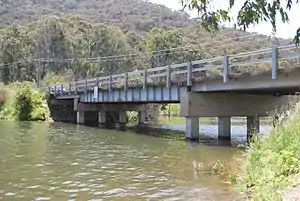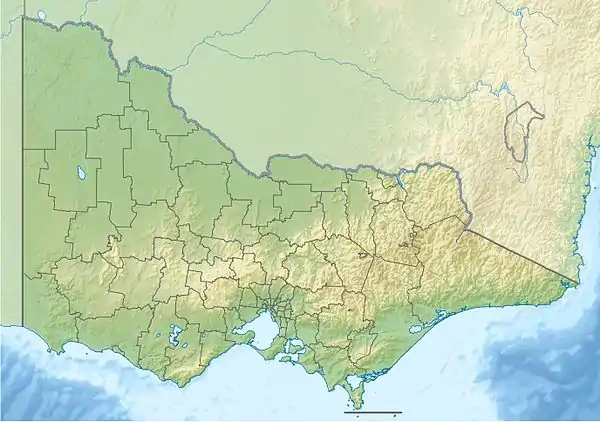Howqua River
The Howqua River, a minor inland perennial river of the Goulburn Broken catchment, part of the Murray-Darling basin, is located in the Alpine region of the Australian state of Victoria. The headwaters of the Howqua River rise below Mount Howitt in the western slopes of the Victorian Alps, and descend to flow into the Goulburn River within Lake Eildon.
| Howqua | |
|---|---|
 The Howqua River, upstream of the Howqua Inlet and the settlement of Howqua, in 2012 | |
| Etymology | multiple possible derivations[1] |
| Native name | Pyerlite (Daungwurrung)[2] |
| Location | |
| Country | Australia |
| State | Victoria |
| Region | Alpine bioregion (IBRA), Victorian Alps |
| Local government area | Shire of Mansfield |
| Physical characteristics | |
| Source | Victorian Alps, Great Dividing Range |
| • location | below Mount Howitt |
| • coordinates | 37°10′43″S 146°37′46″E |
| • elevation | 1,680 m (5,510 ft) |
| Mouth | confluence with the Goulburn River |
• location | Lake Eildon |
• coordinates | 37°13′48″S 146°5′54″E |
• elevation | 265 m (869 ft) |
| Length | 65.6 km (40.8 mi) |
| Discharge | |
| • location | lake |
| Basin features | |
| River system | Goulburn Broken catchment, Murray-Darling basin |
| Tributaries | |
| • left | Lickhole Creek |
| • right | Black Dog Creek, Little Buller Creek, Stockyard Creek, Dungeon Gully Creek |
| National park | Alpine National Park |
| [3] | |
Location and features
The river rises below Mount Howitt on the western slopes of the Victorian Alps, within the Alpine National Park in the Shire of Mansfield. The river flow generally west, joined by five minor tributaries, before reaching its confluence with the Goulburn River within Lake Eildon, created by the Eildon Weir. The river descends 1,410 metres (4,630 ft) over its 66-kilometre (41 mi) course.[3]
Cultural references
The Howqua valley was seasonally occupied by the Taungurung people with the valley being a major route for trade or war between tribes in the area.[4] The Howqua River valley contains a number of archaeological sites of significance including at least two quarry sites for greenstone, an exceptionally hard rock used for stone axes, spears and other cutting tools which the Taungurung traded with other tribes.[5]
The character of Billy Slim in Nevil Shute's 1952 novel The Far Country was based on Fred Fry, a notable fly fisherman, who constructed several huts along the Howqua River and eked out a quiet existence in the river valley.[6]
The Howqua River was one of just thirteen locations worldwide featured on the fly fishing documentary television series A River Somewhere.[7]

Etymology
In the Aboriginal Woiwurrung and Taungurung languages, the river is named Pyerlite, with no clearly defined meaning.[2]
There are four possible origins of the river's current name: firstly, after John "Howka" Hunter (1820–68), a pastoralist; secondly, a portmanteau name from Mount Howitt, where the river rises, and aqua; thirdly, after Howqua, a popular brand of Chinese tea in the early nineteenth century; and fourthly, after Akin Howqua (Ah Kin Wowqua), a Chinese surveyor and early resident of Melbourne.[1][8]
References
- "Howqua River: 2050: Historical Information". 12 August 2011. Archived from the original on 25 July 2014. Retrieved 16 July 2014.
- "Howqua River: 3865: Historical Information: Pyerlite". 12 August 2011. Archived from the original on 25 July 2014. Retrieved 16 July 2014.
- "Map of Howqua River". Bonzle Digital Atlas of Australia. Retrieved 16 July 2014.
- Wonnangatta-Moroka Planning Unit, Alpine National Park Management Plan Archived 31 March 2012 at the Wayback Machine, Department of Conservation and Environment, September 1992, p68
- Wonnangatta-Moroka Planning Unit, Alpine National Park Management Plan Archived 31 March 2012 at the Wayback Machine, Department of Conservation and Environment, September 1992, p69
- "Howqua Hills Historic Area, Visitors Guide" (PDF). Parks Victoria (PDF). Victorian Government. November 2011. Retrieved 4 March 2012.
- "A River Somewhere - Series 1 and 2". ABC Shop Online. Australian Broadcasting Corporation. Archived from the original on 9 April 2011. Retrieved 27 December 2010.
- Lloyd, Brian (7 April 1974). "J. L. Howqua". Mansfield Courier.
